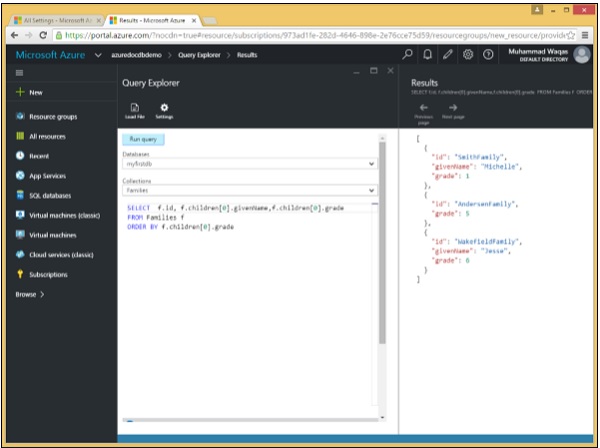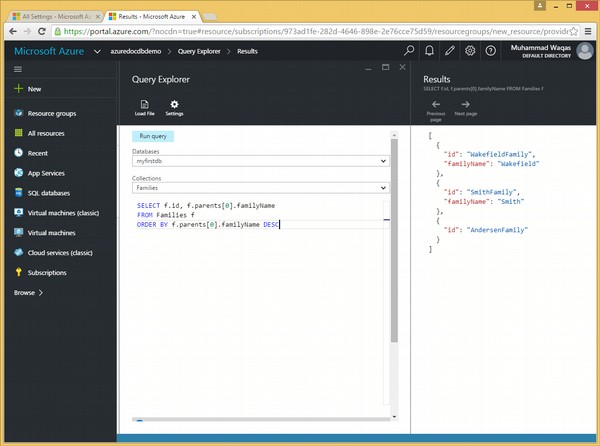
- DocumentDB SQL - Home
- DocumentDB SQL - Overview
- DocumentDB SQL - Select Clause
- DocumentDB SQL - From Clause
- DocumentDB SQL - Where Clause
- DocumentDB SQL - Operators
- DocumentDB - Between Keyword
- DocumentDB SQL - In Keyword
- DocumentDB SQL - Value Keyword
- DocumentDB SQL - Order By Clause
- DocumentDB SQL - Iteration
- DocumentDB SQL - Joins
- DocumentDB SQL - Aliasing
- DocumentDB SQL - Array Creation
- DocumentDB - Scalar Expressions
- DocumentDB SQL - Parameterized
- DocumentDB SQL - Built-in Function
- Linq to SQL Translation
- JavaScript Integration
- User-Defined Functions
- Composite SQL Queries
DocumentDB SQL - Order By Clause
Microsoft Azure DocumentDB supports querying documents using SQL over JSON documents. You can sort documents in the collection on numbers and strings using an ORDER BY clause in your query. The clause can include an optional ASC/DESC argument to specify the order in which results must be retrieved.
We will consider the same documents as in the previous examples.
Following is the AndersenFamily document.
{
"id": "AndersenFamily",
"lastName": "Andersen",
"parents": [
{ "firstName": "Thomas", "relationship": "father" },
{ "firstName": "Mary Kay", "relationship": "mother" }
],
"children": [
{
"firstName": "Henriette Thaulow",
"gender": "female",
"grade": 5,
"pets": [ { "givenName": "Fluffy", "type": "Rabbit" } ]
}
],
"location": { "state": "WA", "county": "King", "city": "Seattle" },
"isRegistered": true
}
Following is the SmithFamily document.
{
"id": "SmithFamily",
"parents": [
{ "familyName": "Smith", "givenName": "James" },
{ "familyName": "Curtis", "givenName": "Helen" }
],
"children": [
{
"givenName": "Michelle",
"gender": "female",
"grade": 1
},
{
"givenName": "John",
"gender": "male",
"grade": 7,
"pets": [
{ "givenName": "Tweetie", "type": "Bird" }
]
}
],
"location": {
"state": "NY",
"county": "Queens",
"city": "Forest Hills"
},
"isRegistered": true
}
Following is the WakefieldFamily document.
{
"id": "WakefieldFamily",
"parents": [
{ "familyName": "Wakefield", "givenName": "Robin" },
{ "familyName": "Miller", "givenName": "Ben" }
],
"children": [
{
"familyName": "Merriam",
"givenName": "Jesse",
"gender": "female",
"grade": 6,
"pets": [
{ "givenName": "Charlie Brown", "type": "Dog" },
{ "givenName": "Tiger", "type": "Cat" },
{ "givenName": "Princess", "type": "Cat" }
]
},
{
"familyName": "Miller",
"givenName": "Lisa",
"gender": "female",
"grade": 3,
"pets": [
{ "givenName": "Jake", "type": "Snake" }
]
}
],
"location": { "state": "NY", "county": "Manhattan", "city": "NY" },
"isRegistered": false
}
Lets take a look at a simple example.

Following is the query which contains the ORDER BY keyword.
SELECT f.id, f.children[0].givenName,f.children[0].grade FROM Families f ORDER BY f.children[0].grade
When the above query is executed, it produces the following output.
[
{
"id": "SmithFamily",
"givenName": "Michelle",
"grade": 1
},
{
"id": "AndersenFamily",
"grade": 5
},
{
"id": "WakefieldFamily",
"givenName": "Jesse",
"grade": 6
}
]
Lets consider another simple example.

Following is the query which contains the ORDER BY keyword and DESC optional keyword.
SELECT f.id, f.parents[0].familyName FROM Families f ORDER BY f.parents[0].familyName DESC
When the above query is executed, it will produce the following output.
[
{
"id": "WakefieldFamily",
"familyName": "Wakefield"
},
{
"id": "SmithFamily",
"familyName": "Smith"
},
{
"id": "AndersenFamily"
}
]